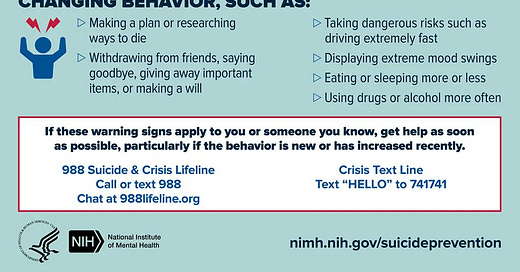Child Abuse and Mental Health Survivors Information - Issue #54
Midway through September. Another change in season, another Summer over. Time to reflect on what we have left to do in 2022 and thinking about what we might want to do in 2023. In those reflections I hope you'll take a moment and consider the victories you've had, even very small ones, since last year. Those victories matter. Celebrate them and celebrate yourself.
I'm proud of all of us for the victories we've had.
New From the Blogs
Sharing - The Dangers of Toxic Positivity — www.childabusesurvivor.net And on and on. No matter the struggle, there will always be someone there to tell you what you're doing wrong to explain why you aren't getting better. What if we simply understand that life is hard? Anxiety and depression are hard. Living in poverty is hard. Living with bipolar or chronic illnesses is hard. Going outside isn't always going to fix that. Being positive isn't going to fix it; some days will just be hard and miserable.
The Daily Podcast Takes on Adolescent Mental Health — www.childabusesurvivor.net I found it interesting because I think the show does a good job of talking to people involved with treating kids and showing what the problem is. Starting with the conversation with a pediatrician, we learn that medical schools don't effectively train doctors to deal with mental health issues. The risks to children they've been taught to deal with are external. These include viruses, broken bones from accidents, stitching cuts, etc. Today, however, the risks to kids have become much more internal. They are harming themselves due to mental health issues at rates we've never seen before. Doctors have not been trained to deal with those kinds of risks, and it is made clear that if you're studying to be a pediatrician, you focus on the external risks because if a kid comes in with an internal risk, you'll refer them to someone who specializes in mental health. Of course, there's a problem with that.


Shared from Elsewhere
Asking for help is hard, but people want to help more than we realize, Stanford scholar says — news.stanford.edu We underestimate just how willing people want to assist others and how positive they feel about doing so.
Rachel Aviv's new book 'Strangers to Ourselves' tackles mental health diagnoses : NPR — www.npr.org NPR's Ayesha Rascoe speaks with journalist Rachel Aviv about her book, "Strangers to Ourselves: Unsettled Minds and the Stories that Make Us." It explores the lives of six people with mental illness.


The Simple Questions That Can Prevent a Suicide | Columbia Magazine — magazine.columbia.edu Psychiatrist Kelly Posner Gerstenhaber discusses the Columbia Protocol for suicide prevention.
Questions to ask a suicidal teenager | Mashable — www.mashable.com Learn the symptoms a suicidal teen might show, then ask these key questions.
Talking About Suicide Helps Us Stay Alive - Mad In America — www.madinamerica.com Normalizing discussion of suicide is the key idea behind Alternatives to Suicide (Alt2Su), peer-led groups intended for adults who have suicidal thoughts or identify as survivors.
From the Archives
How Do We Get Out of the Advocacy Bubble? — www.childabusesurvivor.net If what I do sounds descriptive of how you live your own online life, than let me challenge you. Find a post that resonates with you, on either blog, and share it with your network. Or, share this post with a personal note about how child abuse, or mental illness, has touched your life with your network. Not just with the folks you already interact with about these topics, but outside of that. And then continue to look for ways to reach beyond the bubble of the online survivor community. Because there are survivors and people dealing with mental health problems all around us, and there are also those who remain uneducated about those topics all around us as well.
Link - Stigma Can Be Fatal — www.childabusesurvivor.net I’m not going to quote from this post, because there’s just so much in it that you should read the whole thing, and because I couldn’t decide which part to quote. Chelise makes some strong points about how stigma gets in the way. How it creates a lack of research and funding into suicide prevention,...
Sharing - Thinking About Reaching Out to Someone? Science Says Do It — www.childabusesurvivor.net You should read the whole thing. There's more. Not just about how much other people appreciate it when we reach out but how much having a conversation with a stranger makes us happy, and a host of other things that appear to make us much happier than we anticipate. We're not very good at knowing what makes us happy. Perhaps more importantly, we're not very good at recognizing the mental health benefits of being connected in small ways to other people. Those little connections can make a huge difference.


